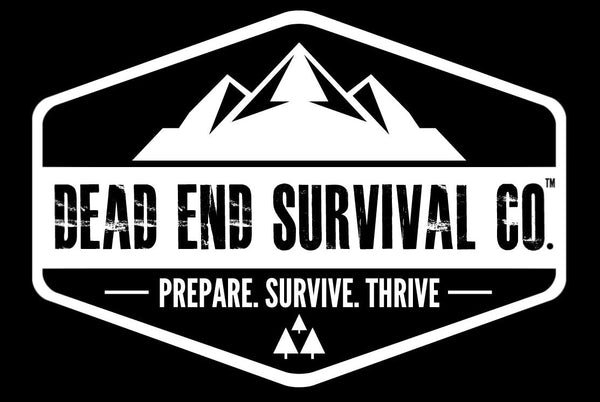
Master the Wild: Essential Bushcraft Skills to Thrive in Nature
Share
Master the Wild: Essential Bushcraft Skills to Thrive in Nature
Imagine being deep in the wilderness with nothing but your wits and a few tools to survive. For some, it’s a nightmare; for others, it’s an exhilarating challenge. Whether you’re a seasoned adventurer or a beginner in outdoor exploration, mastering bushcraft skills is essential to thriving in nature. From fire-starting techniques to knot-tying, foraging, and basic navigation, these skills can mean the difference between survival and struggle. Plus, with the right tools, like the Survival Spark Emergency Magnesium Fire Starter and the Sharp Survival Camping Compass, you can elevate your wilderness game.
Bushcraft is more than just a set of survival skills; it’s a way to connect with nature and rediscover self-reliance. Imagine building a roaring fire with a spark, tying a secure knot to set up a sturdy shelter, identifying edible plants to sustain yourself, and navigating uncharted paths with confidence. These aren’t just survival tactics; they’re empowering skills that make you one with the wild. Let’s delve into the four cornerstones of bushcraft that every outdoor enthusiast should master.
Fire-Starting Techniques: Ignite Your Survival Instincts
A fire isn’t just warmth; it’s life in the wilderness. Fire provides heat, light, a way to cook food, and a psychological boost in challenging situations.
1. Master the Art of Spark-Making
- A reliable fire starter like the Survival Spark Emergency Magnesium Fire Starter is a must-have in any bushcraft kit.
- Gather dry tinder such as birch bark, cotton balls, or dry grass.
- Use the magnesium rod to create a shower of sparks and ignite the tinder.
2. Building a Fire Structure
- Start with a small pile of tinder at the base.
- Add kindling in a teepee or log cabin structure for optimal airflow.
- Gradually add larger pieces of wood once the fire is stable.
3. Fire Maintenance
- Keep your fire sheltered from wind using rocks or a windbreak.
- Always have extra tinder and kindling ready to feed the fire as needed.
Knot-Tying: The Foundation of Outdoor Craft
Knots are essential for building shelters, securing gear, and even saving lives in emergencies. With a few versatile knots in your arsenal, you can tackle almost any wilderness challenge.
1. The Bowline Knot
- Known as the “King of Knots,” the bowline creates a secure loop that won’t slip.
- Ideal for tying ropes to trees or securing loads.
2. The Clove Hitch
- Perfect for attaching ropes to poles or stakes.
- Quick to tie and easy to adjust.
3. The Taut-Line Hitch
- A must-have for adjustable tension, especially when setting up tents or tarps.
- Keeps lines taut without slipping, even under pressure.
Foraging: Nature’s Pantry
Foraging is a vital skill that allows you to find sustenance in the wild. However, it requires knowledge and caution to avoid harmful plants.
1. Identifying Edible Plants
- Learn to recognize common edible plants such as dandelions, clover, and cattails.
- Use field guides to ensure proper identification and avoid toxic look-alikes.
2. Harvesting Techniques
- Only take what you need, leaving enough for the plant to regenerate.
- Wash all foraged food thoroughly before consumption.
3. Supplementing with Protein
- Small game, fish, and insects can provide essential protein in survival scenarios.
- Use snares, traps, or fishing lines to expand your food options.
Basic Navigation: Finding Your Way
Getting lost in the wilderness can turn a pleasant outing into a dire situation. Knowing how to navigate is crucial for safety and survival.
1. Using a Compass
- The Sharp Survival Camping Compass is an invaluable tool for precise navigation.
- Learn how to orient a map with a compass and follow a bearing to reach your destination.
2. Reading Natural Signs
- The sun rises in the east and sets in the west; use it to approximate direction.
- Moss often grows on the north side of trees in the northern hemisphere.
3. Creating Landmarks
- Use rocks, sticks, or other markers to create a breadcrumb trail as you move.
- This helps you retrace your steps if needed.
Gear Up and Get Outside
Mastering bushcraft skills isn’t just about survival; it’s about confidence, independence, and adventure. Equip yourself with essential tools like the Survival Spark Emergency Magnesium Fire Starter and the Sharp Survival Camping Compass to make your outdoor experiences safer and more enjoyable. Practice these skills in controlled environments before heading into the wild. The more prepared you are, the more you’ll thrive.
Bushcraft is an art that combines skill, knowledge, and the right tools. By mastering fire-starting techniques, knot-tying, foraging, and basic navigation, you’ll be ready to tackle any wilderness challenge. So grab your gear at Dead End Survival, head into the great outdoors, and put these skills to the test. Nature is waiting, and with the right preparation, you can conquer it with confidence.
PREPARE. SURVIVE. THRIVE.




